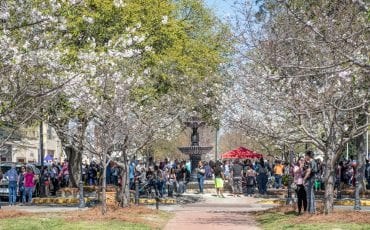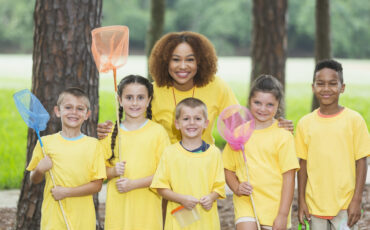Arts = Smarts: Academic Benefits of the Arts

No matter where you live in metro Atlanta, children have opportunities to participate in the arts. At school, through lessons, by attending performances or visiting museums, Atlanta families can learn from the arts all year long.
Music: When children are exposed to music and rhythms, they activate language acquisition and listening skills, as well as memory development without even knowing it.
Visual Arts: When children create drawings to illustrate what they read, they use critical thinking skills involving details and sequence.
Drama: When children act out what they read, they deepen comprehension skills and make personal connections to the text.
Dance: When children experience movement and dance, they can more easily self-regulate their bodies, increasing their ability to focus on what they are reading.
Digital Arts: When children make a video of what they read, they bring their perspective to the text, demonstrating understanding of what they read.
The arts – music, theater/drama, dance, visual arts, digital arts – are right-brained skills, while things like logic, math, science and language are left-brained skills. Often, more importance is placed on those left-brained topics, especially with school-aged children, as they are considered the core academic subjects. However, the arts (and other right-brained traits like emotional intelligence) can help students deepen their understanding of academic topics and how to interact with the world around them.
There are so many amazing school arts programs with talented students in metro Atlanta, and their performances are open to the public. Check out this list of upcoming shows near you!

Second-graders combine the elements of dance and phonics by creating a body position representing the vowel sounds.
Arts Integration
Arts education should not be provided only for students who are interested in a career in the arts but should be an integral part of a well-rounded education. Authentic arts-integration provides opportunities for students to think critically, express themselves creatively, collaborate with peers and educators, and effectively communicate. Each of these skills is integral to learning in the 21st Century.
“The arts also increase depth of knowledge, allow for greater retention of information, and are proven to impact growth and improvement in academic performance across all content areas,” explains Pam Walker, CEO of Atlanta-based non-profit ArtsNOW. “Students who do not thrive in the traditional classroom setting are often more successful in an arts-integrated classroom because they are able to express themselves in a variety of ways. The arts provide a safe place for students to explore academic content standards in hands-on, innovative ways.”
Many metro Atlanta schools, both public and private, offer innovative and exciting arts programs. Lovett’s visual arts department offers a myriad of classes such as ceramics, photography, printmaking, drawing, screenwriting, videography, painting, and sculpture. As an academic affiliate with the High Museum of Art, Lovett’s student artists have the opportunity to display their work at this cultural landmark. DeKalb School of the Arts, located in Avondale, offers concentrations in drama, dance, vocal and instrumental music, visual arts, video technology, creative writing, multimedia and design & production for their high school students.
At Westminster Schools, Director of Theatre Arts Kate Guyton Morgens has designed lessons and classroom structures that are designed to teach students how to use their imagination, take risks, work together in groups, listen respectfully, think critically, discover new ideas, and solve problems. “We also integrate our studies with the curriculum that is set by grade level,” she says. “For example, while the second-grade students are studying folk tales, we will write and perform our own folk tale in class!”
For students, the arts, including theatre/drama, can bridge the gap between subjects. “For instance, exploring plays about historical events or science can lead to a deeper understanding and appreciation of social studies or scientific concepts,” says Senior Vice President of Marketing Jeffery Keilholtz for Broadway Licensing Global. “Studying texts and memorizing lines for a play can enhance memory and cognitive abilities, which can benefit academic learning and propel students forward in subjects such as language arts.”

Students used watercolors and writing to describe their identity and character traits.
Life Skills
Arts education also addresses life skills and social-emotional learning. Engaging with the arts can help students develop emotional intelligence and empathy, which can improve their interpersonal skills and relationships with peers and teachers. “Self-expression, student voice/student choice, perseverance, risk-taking, confidence, and decision making – to name just a few – are all addressed through arts-integrated learning,” says Walker.
Keilholtz echoes this sentiment, “The newfound confidence can spill over into students’ academic pursuits, reducing stress and encouraging them to take risks and tackle challenges.” Morgens’ students in the Lower School learn how to perform in front of others and give feedback to their peers in a respectful way, which is critical to building self-esteem early in life.
For some students, exposure to the arts can be life changing. “As parents, it is important to be an advocate and supporter of the arts in your child’s life. Every child is different and learns in different ways,” says Walker. “Students who struggle with identity, suicidal ideations, decision-making and self-expression appreciate the opportunity that arts-integrated learning offers them with being able to express themselves differently and in a safe, risk-free environment.”
There is a quote often ascribed to Pablo Picasso, which is, “every child is an artist, the challenge is to remain an artist when they grow up.” For Keilholtz, this doesn’t mean that every child should be a professional artist, but that every child has an urge to explore their creative instincts and to express themselves emotionally. “I can think of no safer or more supportive place for a child to do so than in arts classes and programs,” he says. “Try to keep this in mind if your child expresses an interest in participating in theatre or other arts.”
Arts-Enhanced Skills At-a-Glance
- Empathy
- Self-Confidence
- Creativity
- Respect for Others
- Risk Taking
- Collaboration
- Problem-Solving
- Critical Thinking
The Arts are Tools for Teachers:
“ArtsNOW focuses on professional learning in arts integration strategies for teachers in public schools across the Southeast. In a time when teacher retention is of significant importance, arts-integration is a proven practice to renew and refresh teacher engagement while also improving the student learning experience.” – Pam Walker, CEO of ArtsNOW
“For teachers, directing students in theatre arts performances can provide a level of educational satisfaction unlike anything that is possible in the traditional classroom, because you are witnessing students grow, explore, and experience creative and emotional triumphs in real time.” – Jeffery Keilholtz, Senior Vice President of Marketing for Broadway Licensing Global
“From playing theatre games, to researching animal noises and movements, to acting out scripts, to silly warm-ups, to learning about our bodies and voices, the arts make interacting with students more fun.” – Kate Guyton Morgens, Director of Theatre Arts at Westminster Schools
– Tali Benjamin







